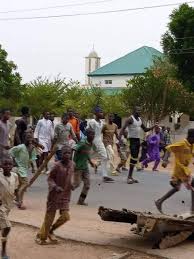In Katsina State, North West Nigeria, last week witnessed an unprecedented event as hundreds of children took to the streets, unguided, in response to a series of attacks by bandits on various villages in the state.
The attacks had persisted for three consecutive days without any intervention from security forces.
This act by the children has sparked widespread concern among well-meaning Nigerians, who view it as a damning indictment of the country’s entire security apparatus.
Many blame the government for allowing the situation to deteriorate to the point where minors felt compelled to resort to protest.
Reports indicate that the bandits carried out multiple attacks on villages across Katsina, including the Wurma community, which endured three days of relentless assault without any response from security agencies.
This dire situation prompted the children, witnessing their parents being mercilessly slaughtered, to take to the streets armed with sticks, chanting their grievances against the perceived indifference of both the government and security forces to their safety and well-being.
The protest, centered in Wurma, primarily comprised children between the ages of 10 and 15. Wurma, once a bustling farming community, now lies deserted, its residents fleeing to neighboring towns in fear for their lives.
Footage of the demonstration circulated on social media, with captions highlighting the children’s outcry over the killings perpetrated by bandits in Katsina.
One of the protesters, Jamil Mabai, captured in the video, described Wurma as a ghost village devoid of security presence, where residents lived in constant fear of being targeted by assailants.
He pleaded for international intervention, lamenting the government’s abandonment of their community.
Public reaction to the protest has been mixed, with some viewing it as a necessary call for attention to the plight of affected communities, while others express concern over the psychological impact on the children involved.
Vice President Kashim Shettima has offered assurances of government action to improve security nationwide, but skepticism persists among many Nigerians, who view such promises as hollow rhetoric in the face of ongoing insecurity.
Critics argue that the government’s failure to adequately address the banditry crisis has left citizens disillusioned and vulnerable.
They stress the urgency of concrete measures to apprehend perpetrators and restore public confidence in the government’s ability to safeguard lives and property.
Legal experts and educators alike decry the state of insecurity in Nigeria, highlighting the government’s constitutional obligation to prioritize the security and welfare of its citizens.
They emphasize the need for a comprehensive national dialogue to address underlying issues contributing to the country’s security challenges.
Meanwhile, residents of Katsina, particularly those in areas directly affected by banditry, continue to endure the daily threat of violence and economic hardship.
They urge the government to heed the children’s plea for action and take decisive steps to quell the escalating crisis before it claims more innocent lives.






